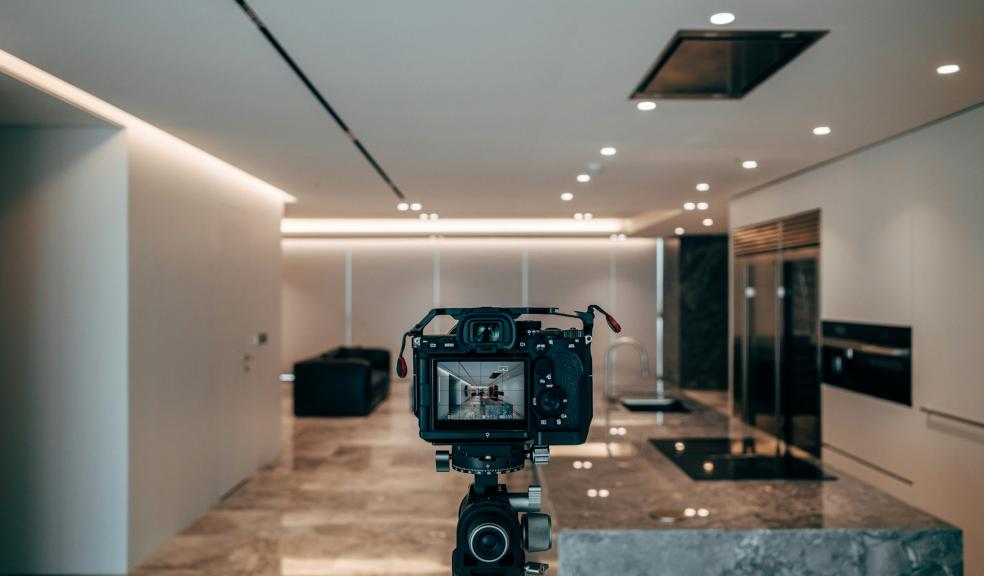
Why Property Developers Are Turning to Video Content to Win Over Buyers
=Property development has always been about vision. Showing potential where others see empty land. Convincing buyers to invest in something that doesn't yet exist.
But the tools for sharing that vision have changed dramatically.
Static CGI renders and floor plans no longer cut it. Today's buyers expect more. They want to experience a property before it's built. They want to understand not just what they're buying, but how it will transform their lives.
Video content has become the answer. Not just any video content. Strategic, story-driven content that connects emotionally with buyers while delivering the practical information they need to make purchasing decisions.
The numbers tell the story. Property listings with video receive 403% more enquiries than those without, according to research from the National Association of Realtors. For developers working with properties that exist only on paper, this statistic becomes even more compelling.
The Attention Economy Hits Property
Buyers today consume information differently than they did five years ago. Social media has shortened attention spans. Online browsing has increased expectations for instant gratification.
Traditional property marketing assumed buyers would spend time studying brochures and floor plans. Modern buyers scroll. They skim. They move on within seconds if nothing grabs their attention.
Video solves this problem. It delivers maximum information in minimum time. A 90-second video can communicate location benefits, lifestyle advantages, and property features more effectively than a 20-page brochure.
But here's where most developers get it wrong. They create video content that mimics print materials. Talking heads reading scripts. Drone footage with no narrative purpose. Virtual tours that feel more like security camera footage than marketing material.
The developers winning buyers understand that effective video content requires professional storytelling expertise. Companies like Film Division specialise in creating video content that doesn't just showcase properties, but creates emotional connections with potential buyers.
Building Trust Through Authenticity
Property development involves significant financial commitment. Buyers need to trust not just the property, but the developer behind it.
Video content builds that trust through authenticity. When buyers see the development team speaking passionately about their project, they connect with the people behind the investment. When they hear from early residents about their experience, social proof becomes powerful.
Barratt Developments recognised this shift early. Their video content strategy moved away from corporate presentations toward resident testimonials and behind-the-scenes development footage. The result? A 47% increase in enquiry conversion rates across their developments.
"Video allows us to show our craftsmanship and attention to detail in ways that photography simply cannot," explains Sarah Mitchell, Marketing Director at Barratt London. "Buyers can see the quality of finishes, understand the flow of space, and visualise themselves living there."
The New Home Buying Journey
The path to property purchase has fundamentally changed. Research from Zoopla shows that 89% of buyers begin their search online. They form opinions about developments before ever visiting a sales suite.
This creates both challenge and opportunity for developers. The challenge: capturing attention in an oversaturated online environment. The opportunity: reaching buyers at the exact moment they're forming purchasing intentions.
Video content performs uniquely well at this crucial stage. YouTube property searches increased 87% between 2019 and 2024. TikTok property content regularly achieves millions of views. Instagram property accounts have become influential sources of inspiration for potential buyers.
Smart developers create video content specifically for these platforms. Short-form videos highlighting unique selling points. Virtual neighbourhood tours showcasing local amenities. Time-lapse construction footage building anticipation for completion.
Berkeley Homes invested heavily in social media video content for their Riverside Quarter development in Greenwich. The strategy generated 2,300 expressions of interest before the sales suite opened. More impressively, 34% of those enquiries converted to reservations.
Overcoming the Visualisation Challenge
Selling off-plan properties requires buyers to imagine finished spaces from architectural drawings. This cognitive leap proves difficult for many potential purchasers.
Video content bridges this gap. Virtual reality walkthroughs allow buyers to experience completed properties months before construction finishes. Lifestyle videos demonstrate how spaces will function for daily living. Animation sequences show transformation from current site conditions to finished development.
The technology has become remarkably sophisticated. Modern rendering software creates photorealistic environments indistinguishable from filmed footage. Interactive virtual tours allow buyers to explore properties at their own pace.
Taylor Wimpey's approach to their Charlton Hayes development in Bristol demonstrates this evolution. Instead of static CGI images, they created immersive video experiences showing seasonal changes throughout the year. Buyers could see how natural light moves through properties. How outdoor spaces transform from spring to winter.
Sales performance improved dramatically. Properties sold 23% faster than comparable developments marketed through traditional materials alone.
The Science of Video Engagement
Understanding why video content works helps developers create more effective marketing materials.
Neuroscience research shows that moving images trigger emotional responses more powerfully than static visuals. Video content activates multiple areas of the brain simultaneously, creating stronger memory formation and emotional connection.
For property marketing, this means buyers remember video content longer and feel more confident about purchasing decisions. They've experienced the property emotionally, not just intellectually.
The format also accommodates different learning styles. Visual learners appreciate seeing spaces and finishes. Auditory learners benefit from narration and ambient sound. Kinesthetic learners respond to movement and camera transitions.
Platform-Specific Strategies
Different platforms serve different purposes in the property marketing funnel. Successful developers tailor video content to platform strengths and audience expectations.
YouTube performs well for detailed property tours and educational content about local areas. The platform's search functionality helps buyers discover developments when researching specific locations or property types.
Instagram excels at lifestyle-focused content. Quick glimpses of interior design details. Time-lapse sunset views from balconies. Behind-the-scenes construction progress updates.
TikTok has emerged as an unexpected property marketing channel. Short-form videos highlighting unique features or renovation transformations regularly achieve viral reach. The platform's algorithm favours engaging content over polished production values.
LinkedIn serves the commercial property market effectively. Video content targeting investors and business buyers performs better on this professional platform than consumer-focused networks.
Measuring Video Marketing Success
Video content effectiveness extends beyond view counts and engagement metrics. Property developers need to track meaningful business outcomes.
Lead quality often improves with video marketing. Buyers who engage with video content typically arrive at sales appointments better informed and more committed to purchasing. They've already experienced the property emotionally and need less convincing about its value.
Sales cycle length frequently decreases. Video content answers common questions before buyers visit sales suites. This pre-qualification process means sales teams spend time with genuinely interested prospects rather than casual browsers.
Conversion rates typically increase. Persimmon Homes reported a 31% improvement in sales suite visit-to-reservation conversion after implementing comprehensive video marketing strategies across their developments.
The Cost Reality
Professional video content requires investment. Production costs vary significantly based on scope and quality requirements.
Basic property tour videos might cost £2,000-£5,000 per development. Comprehensive marketing packages including multiple videos, animation sequences, and virtual reality experiences can reach £15,000-£30,000.
These costs need perspective. Traditional marketing budgets for major developments often exceed £100,000. Video content typically generates superior engagement rates compared to print advertising, outdoor campaigns, or radio sponsorship.
The content also provides lasting value. Well-produced video materials remain effective throughout development sales periods, unlike time-sensitive advertising campaigns requiring constant refresh.
Common Video Marketing Mistakes
Despite growing adoption, many developers still approach video content ineffectively.
The biggest mistake involves treating video as an afterthought. Adding basic property tours to existing marketing materials without strategic planning wastes opportunities for meaningful buyer engagement.
Another common error focuses too heavily on property features rather than lifestyle benefits. Buyers care about how properties will improve their lives, not just specification lists and room dimensions.
Poor audio quality undermines even visually impressive content. Professional sound recording and editing are essential for maintaining credibility and viewer engagement.
Finally, many developers create video content without considering distribution strategy. Producing excellent videos that remain buried on company websites achieves limited marketing impact.
Future Trends in Property Video Marketing
Video technology continues advancing rapidly. Virtual reality experiences are becoming more accessible and affordable. Augmented reality allows buyers to visualise properties within existing environments.
Artificial intelligence is beginning to personalise video content based on buyer preferences. Interactive videos let viewers choose their own exploration paths through properties.
Live streaming has gained popularity for virtual sales appointments and property launches. The technology proved essential during pandemic restrictions and continues providing value for international buyers and time-constrained purchasers.
360-degree video content offers immersive experiences without requiring specialised VR equipment. Viewers can look around spaces naturally while watching through standard web browsers or mobile devices.
Building Video Marketing Capabilities
Developers face choices about video production approaches. Some build internal capabilities with dedicated marketing teams and equipment. Others partner with specialist production companies for professional results.
The internal approach offers control and potentially lower per-video costs for high-volume developers. However, it requires significant investment in equipment, software, and skilled personnel.
External partnerships provide access to professional expertise and high-end production values without ongoing overhead costs. Specialist companies understand property marketing specifically and can deliver superior results more efficiently.
Many successful developers adopt hybrid approaches. They handle simple content creation internally while partnering with professionals for flagship marketing materials and complex productions.
The Competitive Advantage
Video content marketing in property development has moved beyond innovative experimentation to essential business practice. Developers who ignore this shift risk losing buyer attention to competitors who embrace it.
The advantage extends beyond individual sales. Developments marketed effectively through video content often achieve premium pricing. Buyers who connect emotionally with properties through storytelling are willing to pay more for that emotional value.
Brand building also benefits significantly. Developers known for innovative marketing approaches attract better sites, more favourable financing terms, and partnerships with premium suppliers.
Video content creates lasting marketing assets that continue generating value long after initial production costs. Well-crafted property videos remain effective for years, unlike traditional advertising with short-term impact.
The property development industry has always been about selling dreams. Video content simply provides better tools for sharing those dreams with potential buyers. Developers who master these tools will continue winning in an increasingly competitive market.
The question isn't whether video content works for property marketing. The evidence is overwhelming. The question is whether developers will invest in doing it properly, with professional storytelling that creates genuine emotional connections with buyers.
Those who do will find themselves ahead of competitors still relying on outdated marketing approaches. Those who don't may discover that even the best developments struggle to sell when poorly presented to an audience expecting modern, engaging content.









